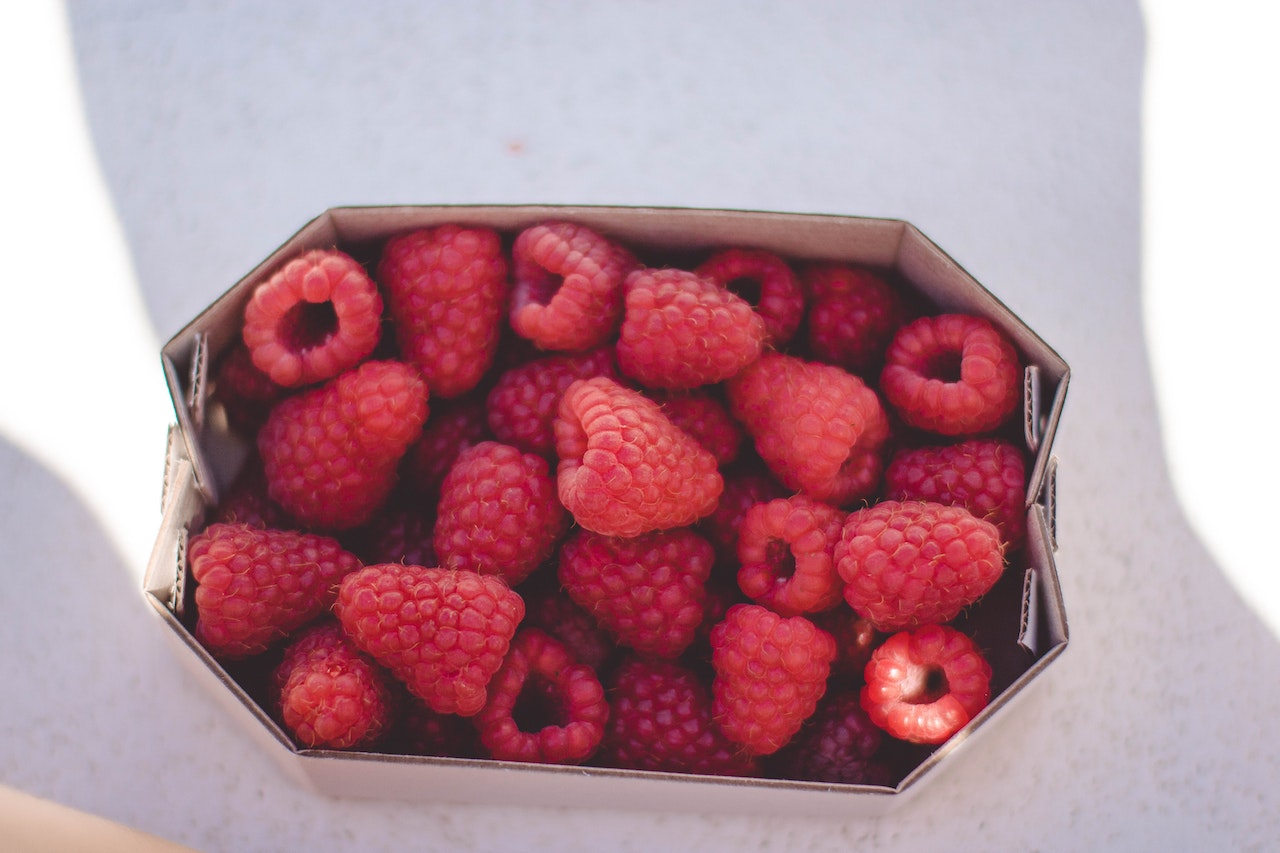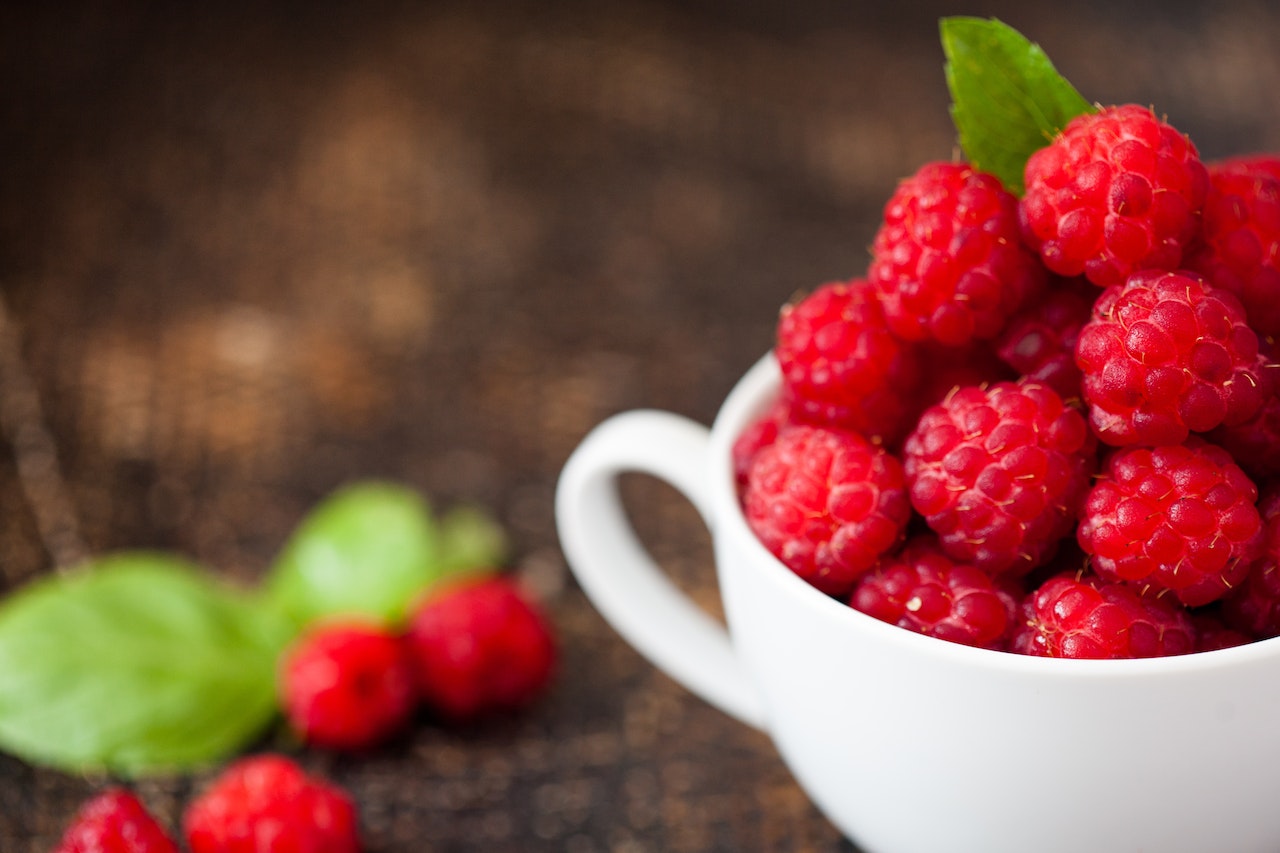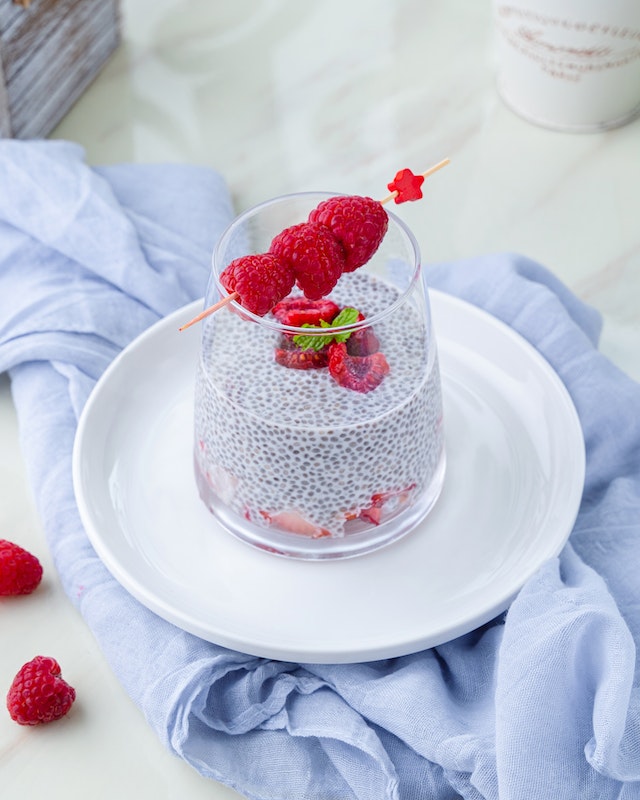Raspberries are one of nature’s most delicious and healthful offerings. Health benefits of raspberries are wide-ranging, making them an important part of a balanced diet. These delightful fruits, often recognized for their vibrant red color, bring much more to the table than just sweetness (1).
Raspberries contain vitamins C and K, fiber, and various minerals (1). What’s more, they are packed with antioxidant compounds that help protect our bodies from damage by free radicals. Low in calories yet high in fiber, raspberries are perfect for those trying to maintain or lose weight while still getting the nutrients they need (2).
From a healthy immune system to cardiovascular health, the benefits of this mighty fruit are plentiful. Let’s dive into the facts of how raspberries are good for you to improve and support your health.
What Are Raspberries?

Raspberries, small and delicate fruits from the rose family, are celebrated for their unique red color and delightful sweet-tart flavor, although they also come in black, purple, and gold. Composed of tiny drupelets around an inedible core, these berries have been part of human diets for millennia. Originating from Eastern Asia, they’ve spread globally, enriching diverse dishes from desserts to salads (3). Packed with dietary fiber, antioxidants, vitamin C, Vitamin K, and manganese, raspberries offer numerous health benefits, supporting immunity, heart health, and digestion, making them a tasty and nourishing choice (1).
Nutritional Value of Raspberries

Raspberries are not only deliciously sweet and tangy, but they also provide various nutrients. These contribute to their significant health-boosting properties, making them a smart choice for a well-rounded diet.
A 100-gram serving size of raspberries contains (4):
- Dietary Fiber: 2.9–3.9 grams
- Protein: 0.34–1.3 grams
- Vitamin C: 13.6–31.1 mg
- Anthocyanins: 0.2–83.6 mg
- Niacin: 0.14–0.90 mg
- Resveratrol: 0.1–0.9 mg
- Piceid: 0.2–3.1 mg
- Potassium: 118.8–388.0 mg
- Iron: 0.29–0.97 mg
Again, the values for dietary fiber, protein, and the various micronutrients are given as ranges due to the variability in different samples of raspberries.
The main nutritional components of raspberries include:
- Vitamins: Raspberries are rich in vitamin C, which supports immune function and skin health. They also provide Vitamin K, essential for bone health and normal blood clotting, and a range of B vitamins (4).
- Minerals: They contain potassium, an essential mineral known to help regulate heart rate and blood pressure. Manganese present in raspberries acts as a co-factor for the antioxidant enzyme superoxide dismutase, contributing to the body’s defenses against damaging free radicals (5).
- Fiber: There is a great source of dietary fiber in raspberries, which helps digestion and contributes to feelings of fullness (6).
- Antioxidants: They are loaded with antioxidant compounds like quercetin and ellagic acid, which help fight inflammation and oxidative stress (7).
- Water: The high water content in raspberries helps keep the body hydrated, which is crucial for overall health, including maintaining a healthy skin complexion and aiding digestion (8).
The diversity of raspberry nutrition, packed with essential vitamins, minerals, and potent antioxidants, enhances their appeal beyond their delicious flavor. Incorporating these nutritionally dense fruits into your diet may improve your health and well-being.
Top 9 Notable Health Benefits of Raspberries

Every nutrient present in raspberries is significant in promoting health and wellness (8). Let’s explore how these nutrients offer specific benefits.
1. May Fight Against Cance
Raspberries contain antioxidants which make them excellent at combating cancer. One of the key antioxidants they contain is ellagic acid, which is found abundantly in berries (9).
2. Maintains Cardiovascular Health
Potassium in raspberries aids in regulating the heartbeat and blood pressure. The minerals such as manganese, copper, and iron in raspberries contribute to the production of red blood cells, supporting cardiovascular health (9).
3. May Boost Mood And Memory
Consuming raspberries may help prevent brain damage and memory loss associated with aging. The antioxidants in raspberries can reduce stress and potentially slow cognitive decline. Notably, anthocyanin works together with quercetin to prevent age-related memory loss (10).
4. May Improve Fertility
Vitamin C and magnesium in raspberries could enhance fertility in both men and women. The antioxidants present in raspberries may protect sperm health, assist in conception, and decrease the chance of miscarriage (11).
5. Promotes Healthy Tissues And Blood Vessels
Raspberries, enriched with Vitamin C, help in the repair of skin tissues and promotes the cell regeneration of skin, bones, ligaments, and blood vessels (8).
6. Provides Anti-inflammatory Action
Raspberries possess anti-inflammatory properties that protect cell membranes, potentially contributing to heart health, boosting the immune system, and aiding digestion. A study highlighted that ellagic acid, found in raspberries, plays a crucial role in the fruit’s anti-inflammatory effects in the gastrointestinal tract (12).
7. Boosts Immunity
The high Vitamin C content in raspberries enhances general immunity against common illnesses and infrequent infections. The antioxidants in raspberries, including phenols and anthocyanin, contribute to overall health and longevity (14).
8. May Help Maintain Eye Health
Antioxidants in raspberries protect the eyes by safeguarding the eye membranes that produce fluid, keeping the eyes moist. Ellagic acid also contributes to maintaining eye health (12).
9. Beneficial for Diabetics
Raspberries are ideal for people with diabetes as these fruits contain rheosmin, tiliroside, and fructose, along with containing a huge amount of fiber and a low glycemic index (13).
How to Select And Store Raspberries?

Always select raspberries that are bright and firm with a rich color. They should be free of mold and soft spots. Raspberries should also be dry and clean. They are usually sold in small plastic baskets (punnets). Check the bottom of the basket for any signs of spoilage.
Storing Raspberries
Fresh raspberries are highly perishable. It’s recommended to consume them within a day or two of purchase. If you need to store them longer, place them unwashed in a single layer on a paper towel inside a loosely covered container and refrigerate. Raspberries can be washed gently just before consuming or using in recipes.
Storing raspberries for optimal quality involves careful temperature management. They should ideally be stored between 0 and 5°C to prevent darkening of color and development of off-flavors, thereby extending their shelf life (15). It’s key to avoid storage at 20°C, as this leads to a loss of firmness and unpalatable aroma. Evaluating the quality of the raspberries daily, particularly considering factors like weight loss, firmness, and taste, can help maintain their freshness and marketability. The shelf life is closely tied to their respiration rate.
How to Eat Raspberries: Diet And Recipes
Whether you are a long-time fan or have just fallen for raspberries, there are numerous exciting ways to incorporate these delicate, sweet-tart berries into your diet and reap the benefits of raspberry. From simple raw snacking to creative culinary uses, raspberries offer versatile options for every meal.
Let’s explore various enjoyable recipes for eating raspberries, ensuring you can relish their distinct taste and reap their health advantages to the fullest.
1. Raspberry Smoothie

- Blend raspberries with yogurt and banana.
- Add a dash of honey and have a healthy breakfast.
2. Raspberry Salad
- Chop some fresh raspberries and add them to a mixed green salad to boost antioxidants.
3. Raspberry Overnight Oats
- Combine oats, milk, and raspberries.
- Let them sit overnight.
- In the morning, you have a fiber-rich breakfast ready.
4. Raspberry Chia Pudding

- Soak chia seeds in almond milk.
- Add raspberries and blend them for a protein-packed pudding.
5. Raspberry Parfait
- Layer Greek yogurt, granola, and fresh raspberries for a protein-rich snack or breakfast.
6. Raspberry Vinaigrette
- Blend raspberries with vinegar and oil to make a tangy and sweet salad dressing.
7. Raspberry Whole Wheat Pancakes

- Add raspberries to your whole wheat pancake batter for a vitamin-rich breakfast.
8. Raspberry Quinoa Salad
- Mix cooked quinoa, raspberries, and your favorite vegetables. This salad is rich in protein and fiber.
9. Raspberry Sorbet
- For a dessert low in calories and high in vitamin C, puree raspberries with a bit of sugar and lemon juice
- Freeze for 2 hours before your serve.
10. Raspberry Almond Muffins:
- Take a cup of whole grains, roast it, and put it in a blender for a fine texture.
- Add baking soda and baking powder to it.
- Add eggs, powdered sugar, milk, butter, or olive oil and mix all the wet ingredients.
- Add dry ingredients and fill the baking tray with the batter.
- Bake for 20-25 minutes, and whole grain muffins with raspberries are ready to make a fiber-rich breakfast or snack.
Including raspberries in your diet can help provide essential vitamins, fiber, and antioxidants. Each recipe provides different health benefits depending on the other ingredients involved.
Conclusion
Raspberries are a true powerhouse of nutrients. The health benefits of raspberries include high levels of antioxidants, which can combat oxidative stress and inflammation. They are packed with dietary fiber that aids digestion and helps maintain a healthy weight. The vitamin C in raspberries supports immune function, and raspberries have a low glycemic index, making them an excellent fruit choice for those managing diabetes. Regularly consuming this delicious fruit could improve heart health, digestion, and blood sugar control. Eating a balanced diet, including raspberries, can help you lead a healthier life.
ALSO READ: Eat, to remain healthy! Hassle free food items you can have on the go throughout the day









